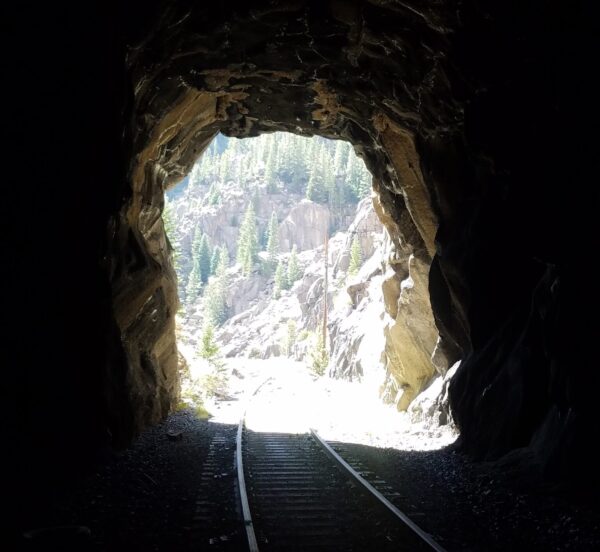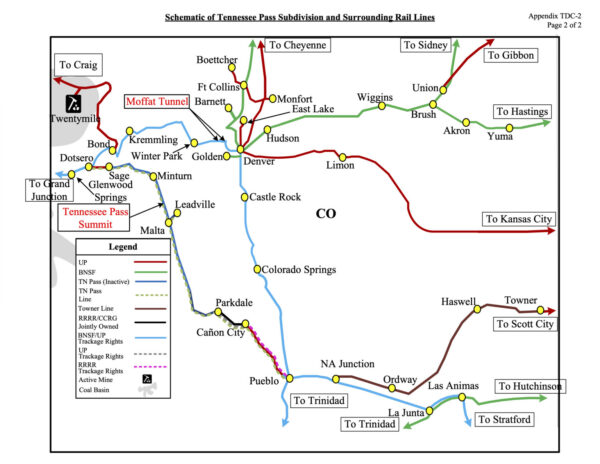Tennessee Pass rail revival still possible as Utah oil train debate continues to rage

It’s been just over a year since a key federal agency rejected an expedited lease deal to revive rail service on Union Pacific’s dormant Tennessee Pass Line through Eagle County, prompting one Denver news site to proclaim the feds had killed the plan.
But plans remain very much alive, and multiple railroad companies are still actively working to revive rail service on all or part of the approximately 220-mile line between Pueblo and Dotsero that has been dormant since 1997. That was when it was mothballed by Union Pacific after a massive merger deal.
Officials with Colorado Pacific Railroad have not lost interest in acquiring the line, or at least gaining access in order to transport its agricultural products to the West Coast if the line is revived.
And Texas-based Rio Grande Pacific continues to update communities within the Tennessee Pass Line corridor, which travels along the Eagle and Arkansas rivers, on its plan to develop both passenger and freight service on the line.
“Union Pacific is supportive of the Rio Grande Pacific Corp.’s plans to develop service on the Tennessee Pass Line to haul local freight and offer local passenger service,” a Union Pacific spokesperson emailed last week. “Our agreement to lease the line to Rio Grande remains in effect, and we are not negotiating with any other company or entity.”
In an email statement earlier this month, a Rio Grande Pacific spokesperson said the company is undeterred by last year’s denial of its application for an expedited lease deal with UP and is continuing to work with local communities on the line.
“Rio Grande Pacific is interested in coordinating with communities along the Tennessee Pass rail line to determine whether there is interest in developing commuter/passenger rail and potentially other local freight that originates or terminates within the corridor between Eagle County airport and Parkdale in Freemont County,” RGPC Community Liaison for Tennessee Pass Sara Cassidy emailed earlier this month.
“We believe the existing rail line could play a role in state and local passenger and freight transportation plans, as well as broader community and economic development plans, workforce housing and access needs, climate action goals and more within this transportation corridor that links world class recreation and resorts, higher education institutions, airports and communities,” Cassidy added.
Cassidy would not address a lawsuit challenging Rio Grande Pacific’s Uinta Basin Railway project in Utah that was filed by Eagle County and several environmental groups opposing oil trains traveling on the active UP Moffat Line tracks along the Colorado River.
Approved by the U.S. Surface Transportation Board (STB) in December, the Utah project could send up to 350,000 barrels of waxy crude oil a day in heated tanker cars on UP’s active Moffat Line through Dotsero in western Eagle County, along the Colorado River, through the Moffat Tunnel near Winter Park, down into Denver, south along the Front Range and on to Gulf Coast refineries (see map below).
Both Colorado senators and U.S. Rep. Joe Neguse told RealVail.com in March that they support local opposition. But Rio Grande’s Cassidy insists the company is not interested in the Tennessee Pass Line in connection with the Uinta Basin project.
In a March meeting with the Chaffee County commissioners, Cassidy reiterated that Rio Grande, doing business as Colorado Midland & Pacific, had amended its lease application with UP to exclude hazardous materials on the revived Tennessee Pass Line. She said there are no plans for oil transport but that there is particular interest in passenger service to and from the Eagle County Regional Airport in Gypsum.
However, Eagle County officials said they have not heard from Cassidy in recent months regarding the project.
The Chaffee County commissioners questioned whether the proposed prohibition on hazardous materials would include Uinta Basin’s waxy crude, which is too thick for pipelines. Cassidy said she didn’t know if it qualifies under federal law.
Regardless, rival Colorado Pacific Railroad – when the expedited lease was rejected by the STB last year — questioned the prohibition of certain kinds of freight by Colorado Midland & Pacific in the first place. The STB, by rejecting the expedited deal, did not accept the terms of the hazmat exclusion.
“CMPR’s [Colorado Midland’s] filing was unusual because it asks the STB to limit the terms of its lease with UP, rather than UP and CMPR exercising their right to do so as parties to that agreement. Be that as it may, if the STB grants the request, it will not eliminate the underlying issue of whether crude oil, coal or hazardous commodities traverse the line because UP is the underlying owner of the line and it cannot refuse to transport those commodities if someone makes a reasonable request for service,” a Colorado Pacific Railroad official wrote to RealVail.com prior to the STB rejecting the expedited lease and its hazmat ban in favor of a more extensive environmental review.
“Colorado Pacific’s primary objective is to ensure that the Tennessee Pass be a viable alternative to UP’s Moffat Tunnel route for freight traffic, with access to both western class one carriers at each end. In satisfaction of a statutory need to ‘serve the public convenience and necessity,’ Colorado Pacific has also offered to provide at its expense once daily roundtrip passenger service each way between Pueblo and Minturn, which service could be extended as far west as the Eagle [County] Airport. However, Colorado Pacific considers that there is inadequate population density to support commuter rail in the Eagle Valley, and will not be pursuing that objective. Commuter rail projects are traditionally subsidized by public funds, and the local tax base seems insufficient for such purpose. Commuter rail in the Eagle Valley is a chimera,” Colorado Pacific concluded.

Eagle County Attorney Bryan Treu offered his own legal opinion on the exclusion of certain types of freight if the Tennessee Pass Line is ever revived:
“In general, a railroad cannot selectively decline to ship particular commodities if there is a reasonable request from a shipper to ship it,” Treu said. “This includes hazardous materials.”
While Eagle County’s lawsuit is aimed at oil transport on the active Moffat Line, which connects with the Tennessee Pass Line at Dotsero, and based on environmental concerns regarding spills, wildfires and the continued consumption of fossil fuels during a climate crisis, Treu is keeping an eye on the ripple effects related to the possible rail revival on Tennessee Pass.
“Regarding whether waxy crude oil qualifies as a ‘hazardous material,’ that depends on who is describing the materials,” Treu said. “The Pipeline and Hazardous Materials Safety Administration has detailed regulations regarding the labeling and shipping of materials of varying levels of hazardousness. This includes labeling for certain types of crude oil.
“In contrast, under CERLCA [Superfund law], petroleum is excluded from the definition of hazardous substance,” Treu added. “More research would be required to determine whether waxy crude oil is considered a hazardous waste in this rail context, which is not really an issue in our case.”
Hanging over the entire debate is a push by the Biden administration to solve post-pandemic supply chain issues by pushing for more competition and better freight service from the nation’s major rail companies, which have pared back staffing and service to increase profits after the merger mania of the 90s.
The Biden administration chairman of the U.S. Surface Transportation Board – and the sole dissenter in the STB’s approval of the Uinta Basin oil project – has called for the CEO’s of the four largest rail carriers, including UP, to come to Washington, D.C. to testify April 26-27.


Latest posts by David O. Williams (see all)
- During National Small Business Month, Target, DreamSpring put funding bullseye on underrepresented communities in Denver area - May 29, 2025
- Colorado senator urges Supreme Court to hold Trump administration in contempt on deportations - April 19, 2025
- Conductor who brought back Colorado ski train wants to use rail to save state’s highways for skiing - March 20, 2025

You must be logged in to post a comment Login